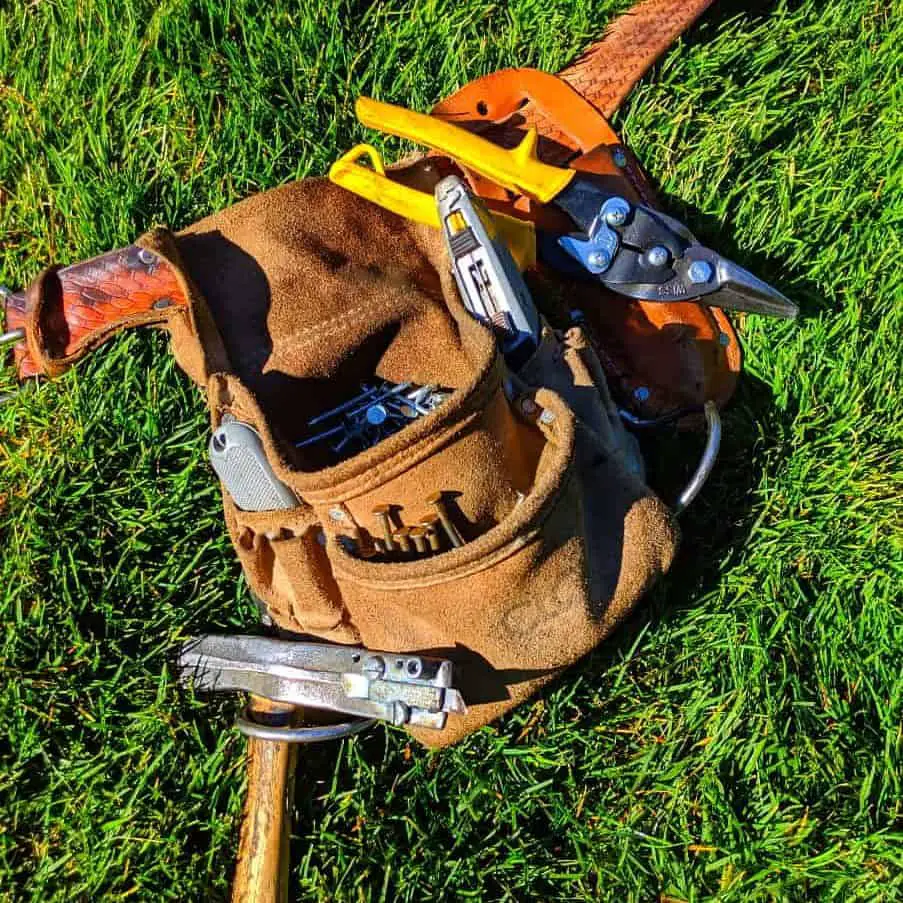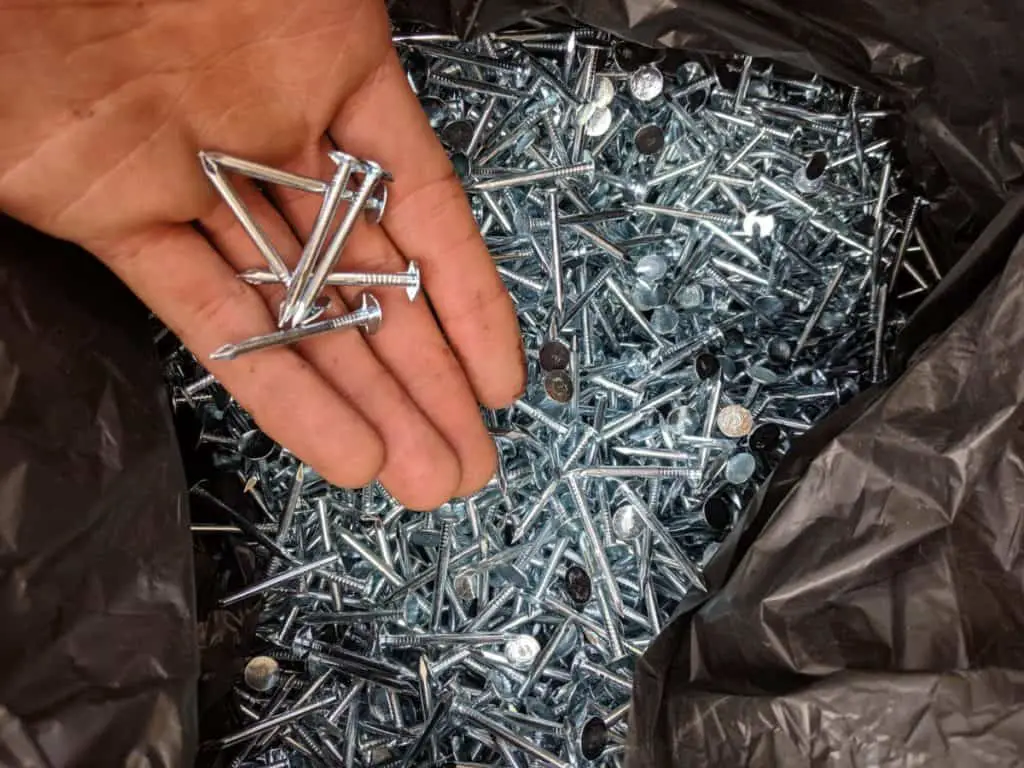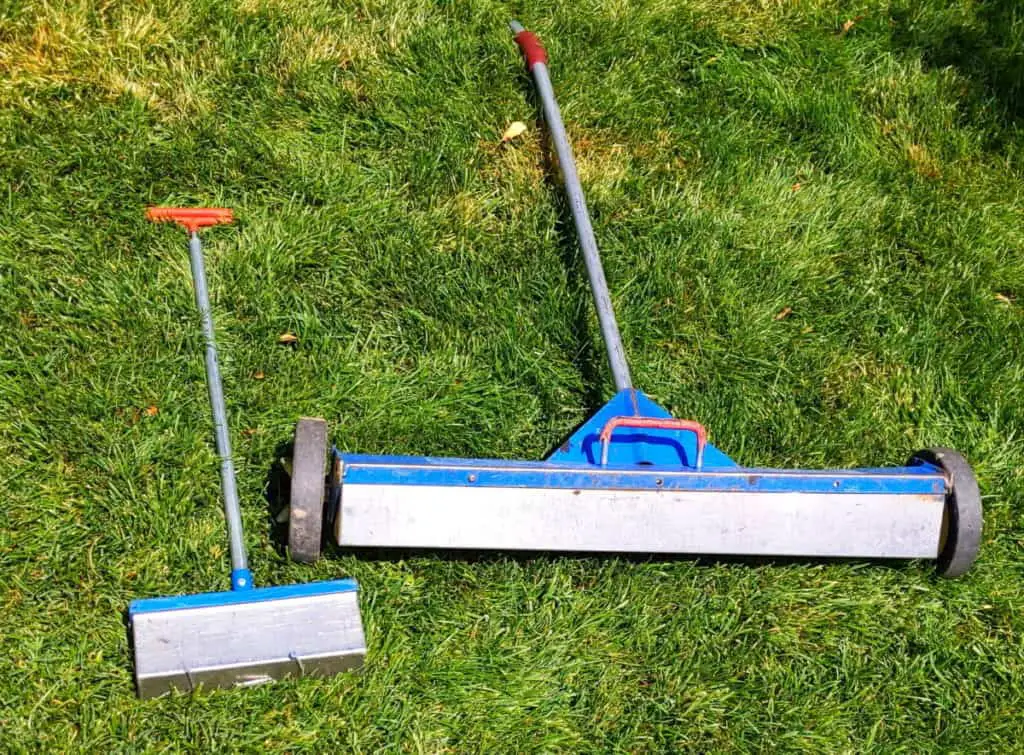
While it is almost always recommended to leave a roofing project to a professional roofer, sometimes a hands-on homeowner can do a job themselves.
Whether it is a leaking pipe flashing that needs to be replaced or a full roof installation on a DIY-backyard shed, one of the questions that might arise is whether roofing nails are galvanized.
Are roofing nails galvanized? Technically yes, galvanized nails are exactly what you will get when asking for “roofing nails” at your local hardware store. Most nails used in construction, especially roofing, are galvanized, but that does not mean you NEED galvanized nails for your specific roofing material.
To this question, one might expect a straightforward yes or no answer. However, there is much more to roofing nails than meets the eye. Let us take a closer look at galvanized roofing nails before we hit the nail on the head.
Galvanized roofing nails are versatile and have many benefits; for example, they are low in costs, easy to use, durable, and they are far less likely to crack and shrink during season changes. However, these nails are mostly recommended for asphalt roofs. Since not all roofing materials have the same properties, not all will require the same nail type. Therefore, it is crucial to understand your nails before taking on a roofing project.
Purpose of Roofing Nails
The purpose of the roofing nails during a roof installation is to fasten the shingles, to attach roof tiles, metal sheets, and to install roofing felt for waterproofing.
While all roofing nails have wide-flat heads and mainly short shanks they can come in different forms, sizes and materials. You will find that roofing nails have sharp and pointed tips which makes them easy to insert to avoid breaking the shingles or damaging the wood when the nails are driven through.
What are the Different Types of Roofing Nails?
When shopping for roofing nails, you will have a choice between different materials including, aluminum, stainless steel, copper, and galvanized steel.
Furthermore, you will find a variety of nail shank lengths at any building supply store. The shank of a nail is lower part of the nail that gets inserted into the roof decking.
A 1-2 inch nail shank is best for ordinary roofing construction while the longer nail shanks are better for thick wooden shingles and shake.
Click on these links to learn more about wood shingles and shake.
The shank of roofing nails also differs in style, including screw shanks with a twisted shaft, ring shanks with a wide head and standard smooth nail shanks.
Which Type of Nail is the Best?

There is no single rule when choosing roofing nails since each roofing material will have different needs.
Different roofing materials require different types of nails. For instance, for metal sheets and shingles, it is best to use aluminum nails. However, it is important to keep in mind that if you live in a coastal area, aluminum nails are not recommended as they do not do well when exposed to salt or chemicals. Therefore, if you live by the coast, it is best to use stainless steel nails.
Furthermore, stainless steel nails are also the right choice if you need to fasten tiles or slate. For these types of roofing materials, copper nails are also an excellent choice.
If you are working with asphalt shingles, the number one choice is galvanized roofing nails. Since most homes have asphalt roofs, galvanized nails are considered standard roofing nails as they are most commonly used. These types of nails have a zinc-coat, which ensures that they hold up better against rust. Nails like these will last as long as the roof does because they are very durable. Nevertheless, some galvanized nails are better quality than others.
Nail Size
Another thing to remember when choosing the nails for your roof is their size. Roofing nails usually have standard lengths ranging from 1 to 2 inches, but they can come in longer lengths as well. The length of the nail will depend on the roofing material you choose. Although a one-inch nail will work for asphalt or fiberglass roofing materials, it might not be the best choice for wood shingles as longer-thicker nails will provide more security.
Nail Shank
When it comes to the shank of the nails, one will have to choose between different types. For instance, galvanized screw shank nails are excellent for fastening wood roofs as they are twisted and have sharp diamond tips. If you live in an area with strong winds, it would be best to choose a galvanized ring shank nail with a larger nail head as they are stronger and good for fastening shingles.
Price
The prices of roofing nails will vary depending on the material of which they are made. For instance, copper nails are usually the most expensive, followed by stainless steel, aluminum, and then galvanized nails, which are the least costly. Keep in mind that the prices of each type of nail will also differ depending on specific characteristics; for example, the prices on galvanized nails will fluctuate depending on the galvanized method that was used.
Overall, when choosing roofing nails, one should select the type that is best suited for one’s roofing materials.
Which Galvanized Nails Are Best?
When choosing galvanized nails for a roof, it is always best to go for the hot-dipped galvanized ones. The cheaper galvanized nails like the electroplated nails are not the best choice.
There are other methods to coat nails with zinc, but the gold standard for roofing is the hot-dipped galvanized nails. Make sure to check the package description of the nails to know exactly what you are getting.
Recommendations?
When it comes to professional roofing, there are specific codes and recommendations for just about everything, including the type of nails, the length of the nails, and methods used to penetrate the nails. These specific will differ for each type of roofing materials.
Manufactures also have specific standards to apply to, and the specification on the packages should be correct. Therefore if you want to avoid any complications, make sure you choose a professional roofer who knows the codes and regulations of your roofing project.
I recommend finding a professional roofing contractor through our trusted partner Home Advisor because they allow you to get up to 4 quotes for free. This allows you to compare and choose the best roofing professional for your needs.
Check them out by clicking this link.
Is it Better to Hand-Nail or Use a Pneumatic Nailer?
Even though manufacturers claim that either method is suitable, nails driven too far into the shingles due to a nail gun that was set too high can lead to a void of the shingle manufacturer warranty. Therefore, the roofer must be efficient with whichever method he uses.
Nonetheless, neither of these methods are right or wrong, as both have their pros and cons. Some roofers prefer a hammer while others prefer a pneumatic nailer.
However, in some instances, it is better to hand-nail the shingles as the roofer will have a better feel for the nail placement, which results in a better installation.
To read more about the reasons why I personally prefer hand nailing you can click here.
Best Roofing Hammer?
There are many great roofing hammers on the market, and a perfect example of such a hammer is the AJC roofing hatchet, which is an affordable roofing hammer with a wood handle. It comes with an adjustable shingle gauge so that both left-handed and right-handed roofers can use it.
This hammer is lightweight, contains a nail puller at the magnetic head, and it even has an incorporated utility blade in the head that can be used for cutting shingles along the rake edge of the roof.
You can check out this hammer and my list of Top 6 Best Roofing Hammers Here.
Best Pneumatic Nailer?
When choosing a roofing nailer, it is best to get one that is more on the light side, and one which drives nails with few jams. Any other features on the nailer are extra and can help make the job easier.
The Bostitch Coil Roofing Nailer is an excellent example of a pneumatic nailer that gets the job done with ease. This nailer is a good quality roofing tool that has an incredible 7-year warranty.
Besides that, it is lightweight, durable, and has a smooth operating system, the Bostitch Nailer contains some extra features as well. It has a lockout mechanism that will prevent firing when it’s empty, it has a single-action side load canister for fast nail loading, and an adjustable shingle guide for shingle spacing.
Click Here to View This Nailer & To Read About The Other Top 14 Picks For Roofing Nailers.
Related Questions:
Are roofing nails magnetic?
The magnetism of the nails will depend on the materials they are made up with. Certain materials like aluminum and copper are not magnetic, but the nails made with them might be to some extent since there may be different kinds of materials in the mix. Therefore, it is fair to say that most nails are magnetic, although some are more than others.

Magnetic roofing nails can be a big advantage for roofing because it allows you easily pick up nails that have fallen off the roof. You can purchase a magnet roller that can roll over the grass and sweep the gardens to pick up any nails so your kids do not step on them.
Click here to check out the magnetic rollers and to see my other recommend roofing gear!
Are all nails galvanized?
Not all nails are galvanized no, and not all nails need to be galvanized. Galvanization is best for nails that are meant to be used outdoors to protect them from rust. However, other nails like copper, stainless steel, and aluminum also contain properties that hold up well against corrosion, and therefore, they can also be used outdoors for specific roofs.
What are galvanized nails?
Galvanized nails are nails that have been put through the process of galvanization. There are various ways to perform this process, of which hot-dipped galvanization is the most effective. During galvanization, steel or iron nails get covered with a protective zinc layer, which allows them to become durable against rust and corrosion.
Is there any way to tell if the nails are galvanized?
Galvanized nails do not have a shine to them like some other nails, so if you place them under a light, they will appear dull and do not reflect as other metals do. Depending on the method they were galvanized, some of them will have drip marks on the sides, and most of them are not smooth, which will give them a rough feel.
